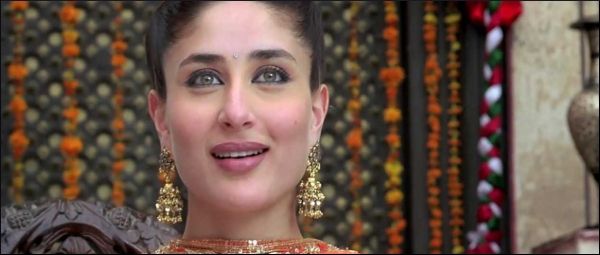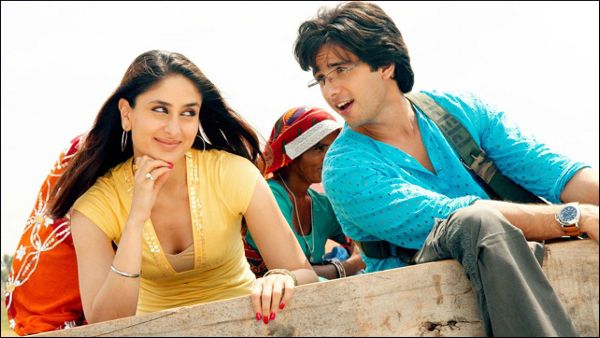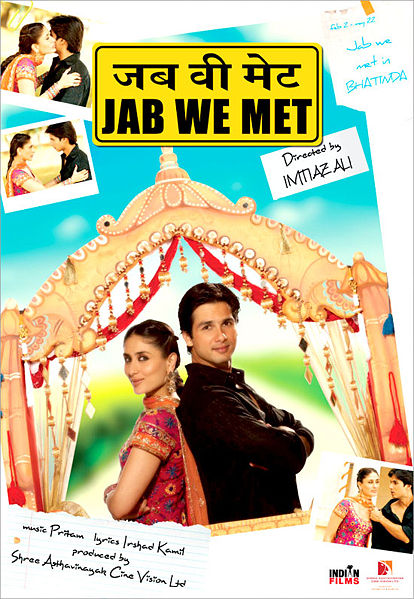In 2005, director Imtiaz Ali caught India’s eye with Soch Na Tha, and in 2007, he won the country’s heart with Jab We Met, which brought Shahid Kapoor and Kareena Kapoor together again on the screen. Although, at the time, they were real-life lovebirds, they broke up during the shooting of this film. Fortunately, their off-screen difficulties do not affect their on-screen characters, Aditya and Geet, respectively. The movie’s title is a very “Bombayia” mixture of Hindi and English, and it reflects how people in Mumbai speak. “Jab” means “when,” making the title “When we met.” And the film is just that, the long-winded tale of how Geet and Aditya got together.
The two find each other aboard a night train. Aditya feels almost suicidal while Geet is as bubbly as one can be. She divulges her life story, telling Aditya how she plans to elope with her boyfriend Anshuman, who, of course, her parents do not approve of. Her incessant chatter makes Aditya want to leave the train, but Geet tries to convince him to remain on board. Instead, they both wind up missing the train and thus begins their cinematic and penniless journey across Northern India.
"In 2007, director Imtiaz Ali won India’s heart with Jab We Met, which brought Shahid Kapoor and Kareena Kapoor together again on the screen."
After their adventure, various events simultaneously push them together and keep them apart. Geet ends up not marrying Anshuman, but Aditya believes she has. Still, he is a hopeless romantic and he launches a product named “Geet.” Her family sees it advertised on television and, somehow, this brings the star-crossed lovers back together and they live happily ever after.

Just like the title, the film is full of Hinglish, a combination of Hindi and English. At one point, Geet says, “Main apni favourite hoon,” which means “I am my own favourite.” She could have used the word “priyapatra,” but more often than not, one can hear Indians from all sectors of society use the word “favorite” in lieu of its Hindi counterpart. Another example appears when Aditya says, “Tu original piece hai,” which translates as “You’re an original piece.” This is the Hinglish equivalent of the English expression, “You’re quite a piece of work.”
"Just like the title, the film is full of Hinglish, a combination of Hindi and English."
Sometimes, English words are employed in modified forms. In one scene, Geet says, “Funda zyada ho gaya na?” This loosely translates as: “There are too many fundamentals, are there?” The word “funda” is actually a contraction of the English word “fundamentals,” though English speakers have never adopted this abbreviation. In Hindi or English, Indians use this word in situations in which it roughly means “a way of doing things” or “the logic behind something.” They will say such things as, “My funda in life has always been…” or “What’s the funda behind physics?” So, while “funda” is technically an English derivative, it has been entirely adopted and transformed by Hindi speakers!
In yet one more example of Hinglish, Kareen says, “Bachpan se hi naa… mujhe shaadi karne kaa bahut crazy hai… by God” (Since childhood… I have been crazy about getting married… Swear to God). As one can see, the word “crazy” is retained and “by God” is a Hindi usage of an English phrase. The destiny of the film’s two stars, the story of “jab” they met, can be summed up in one of Geet’s Hinglish quotes: “Aaj tak life mein ek train nahin chuti meri” (To date, I have never missed a train in life). To that, one might offer another Hinglish sentence: “Sub kuch, ek reason ke liye hota hai” (Everything happens for a reason).




